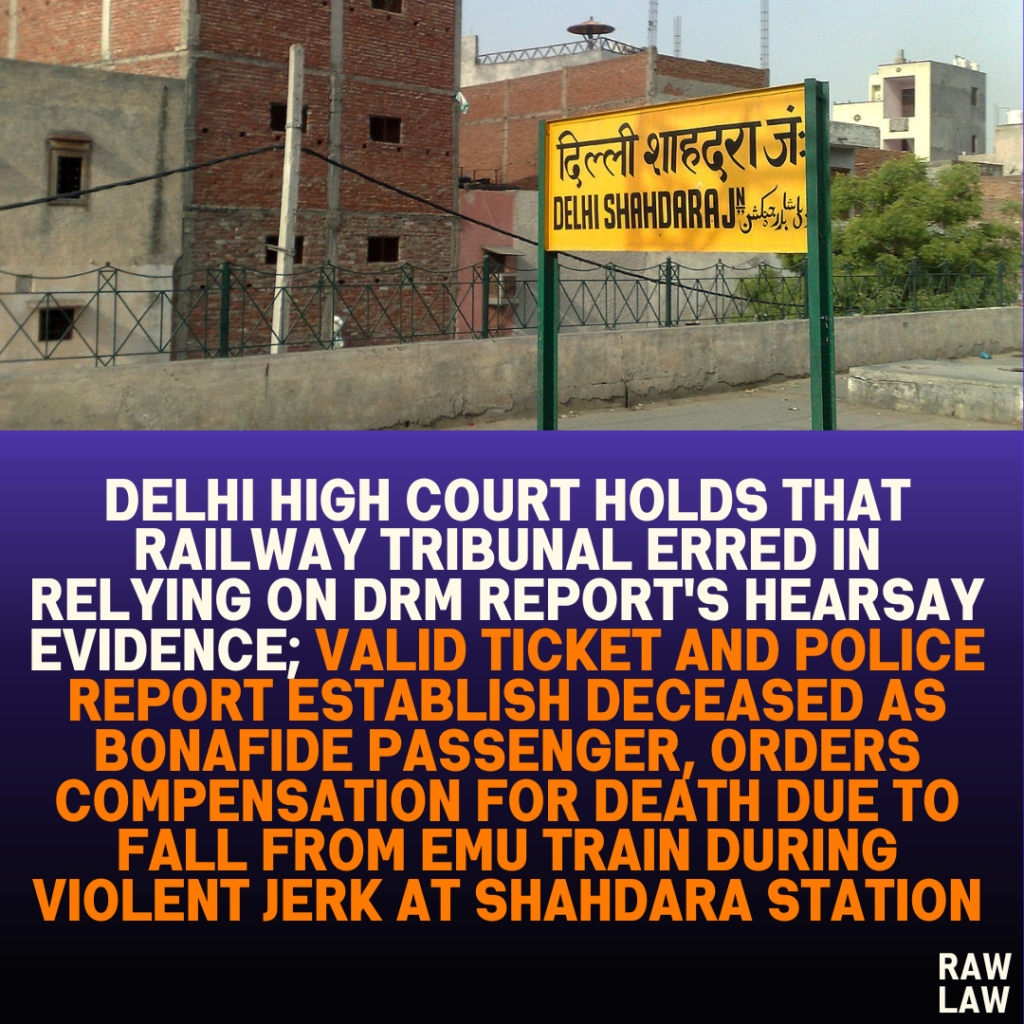Court’s Decision:
The Delhi High Court allowed the appeal filed by the appellants, setting aside the impugned order of the Railway Claims Tribunal, which had rejected the claim petition on the basis that the deceased was not a bonafide passenger. The High Court remanded the matter back to the Tribunal, directing it to award compensation as per the relevant schedule attached with the Railway Accidents and Untoward Incidents (Compensation) Rules 1990. The Tribunal was given eight weeks to complete the process, with a direction to decide on the rate and period of interest if payable.
Facts:
- The deceased, while traveling from Ghaziabad to Shahdara in an EMU train on 19.07.2012, fell from the train due to a violent jerk and heavy rush near the door, resulting in fatal injuries.
- A valid ticket was recovered from the deceased’s possession, proving that he had purchased the ticket for the journey at 14:52 hours the same day.
- The claimants, who are the deceased’s widow and children, filed a claim under Section 16 of the Railway Claims Tribunal Act, 1987, seeking compensation.
- The Railway Claims Tribunal rejected the claim, stating that the deceased was not traveling in a passenger train but had jumped from an Empty Coach Rack (ECR), thus disqualifying him from compensation.
Issues:
- Whether the deceased was a bonafide passenger.
- Whether the death of the deceased constituted an “untoward incident” as defined under Section 123(c) read with Section 124-A of the Railways Act, 1989.
Petitioner’s Arguments:
- The petitioners argued that the deceased was a bonafide passenger, as evidenced by the recovery of a valid journey ticket from his possession.
- The incident occurred due to overcrowding and a violent jerk, leading to his fall from the train.
- They placed reliance on the police investigation report and statements made by witnesses, such as one Mr. Mandeep, who corroborated that the deceased fell from the EMU train.
Respondent’s Arguments:
- The respondent (Union of India) contested that the deceased was not a bonafide passenger, asserting that he had jumped from an Empty Coach Rack and was not in a passenger train.
- They based their arguments on the DRM report, which alleged that the deceased was hit by or fell from an ECR at the Shahdara Railway Station.
- The respondent sought to discredit the evidence presented by the petitioners, relying solely on the findings of the DRM report.
Analysis of the Law:
- The High Court analyzed Sections 123(c) and 124-A of the Railways Act, which define “untoward incident” and provide for compensation in cases of accidental falls from trains.
- It further relied on the Supreme Court’s judgment in Union of India v. Rina Devi, where it was held that negligence or contributory negligence of the victim cannot bar compensation under Section 124-A if the incident occurred while boarding or deboarding a train.
Precedent Analysis:
- Union of India v. Rina Devi: The Supreme Court ruled that self-inflicted injury requires intention and not mere negligence, thus broadening the definition of “untoward incident” to include accidental falls while boarding or deboarding.
- The Delhi High Court applied this principle, emphasizing that the deceased’s possession of a valid ticket and corroborative evidence proved his status as a bonafide passenger.
Court’s Reasoning:
- The High Court found that the Railway Claims Tribunal had erred in solely relying on the DRM report, which was based on hearsay and lacked corroborative evidence.
- The court observed that the respondent failed to produce any independent witness to substantiate its claim that the deceased had jumped from an ECR.
- The recovery of a valid ticket, witness statements, and the police report all pointed to the deceased being a legitimate passenger of the EMU train.
- The court rejected the respondent’s argument that the deceased was not traveling in a passenger train, noting that the DRM report was not backed by any concrete evidence.
Conclusion:
The High Court set aside the impugned order of the Railway Claims Tribunal and remanded the matter back to the Tribunal for determination of compensation in favor of the rightful claimants. The Tribunal was directed to complete the process within eight weeks and decide on the interest component as per the Railway Accidents and Untoward Incidents (Compensation) Rules.
Implications:
This judgment reaffirms the principle that mere reliance on a DRM report without corroborative evidence cannot be the basis for rejecting compensation claims. The ruling underscores that possession of a valid ticket strongly establishes the status of a bonafide passenger and that even in cases where there is a dispute over the nature of the train, the burden of disproving bonafide status lies with the Railways. It also highlights the importance of adhering to the objective of the Railway Claims Tribunal Act, which aims to provide swift and fair compensation to victims of railway accidents.
